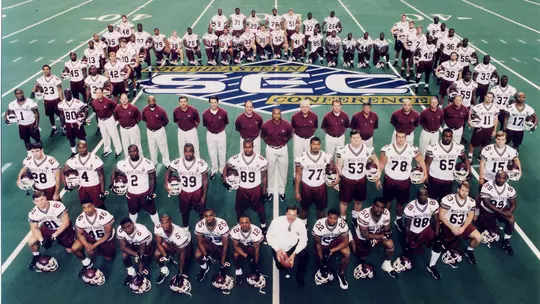
How The West Was Won
Mississippi State’s division-winning 1998 football team had the perfect mix of attitude and ability.
Joel Coleman, Senior Writer
11/1/2023
STARKVILLE – Floyd Womack was about three years old. He was a big and stocky child that reminded his mother of a wrestler at the time by the name of Porkchop Cash.
Well quickly, Floyd was no longer Floyd. His mother handed him a new moniker: Pork Chop.
WOMACK: “It just stuck to me. I tried to get rid of it every once in a while. When Mom started telling me about college and how it was a step above high school and a little more prestigious, I was like, ‘I don’t think I want to be Pork Chop. I want to be Floyd Womack.’”
Life had other plans.
Womack went on to use his massive frame to become one of the greatest offensive linemen in Mississippi State history. And to Bulldogs everywhere, he’ll forever be Pork Chop.
WOMACK: “I’ll never forget [early in my career at] Meet the Bulldogs at the stadium in front of our fans…[former head coach Jackie Sherrill] got the mic [to introduce me] and sure enough [he said], ‘Pork Chop Womack.’ It’s been that way ever since.”
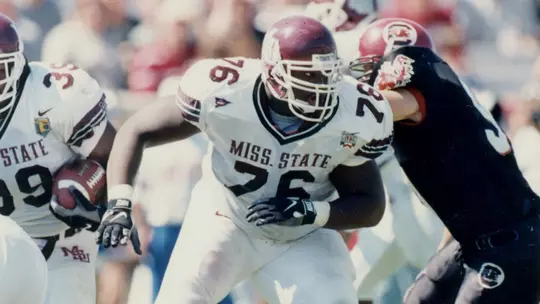
It certainly seems fitting that one of the individuals who played a key part in MSU’s run to the 1998 Southeastern Conference Western Division championship was given a nickname rooted in professional wrestling. For wrestling and its scripted dramatics have long been all about big personalities, attitude and athleticism – three traits that also defined the bunch that put Maroon and White on the SEC’s biggest stage.
There was Pork Chop, sure. But there was also the confident young quarterback, Wayne Madkin. And who could ever forget the other offensive stars? Tough-as-nails running back J.J. Johnson. Lightning-fast receiver Kevin Prentiss. Eventual NFL tight end Reggie Kelly, and so many others.
And how about that defense, full of some of the toughest, most talented Dawgs of all time? Robert Bean. Anthony Derricks. Edward Smith. Barrin Simpson. Kevin Sluder. The list goes on and on.
But to tell the story of the 1998 State football team, it has to begin at the top with Sherrill. The man lovingly known down in Starkville as The Kang, Sherrill put the Dawgs on the path to the top of the West long before they were actually bound for the league title game in the Georgia Dome.
WOMACK: “It all started with the head coach. Coach Sherrill did a great job of recruiting those couple of years before [‘98] and it just all came and jelled together. It always starts up top.”
MADKIN: “He was a player’s coach, and he treated us like men. He was fair and consistent, and also, he gave us grace. He realized some of us were still growing into men…He allowed us to grow and become men and didn’t write us off after one mistake.”
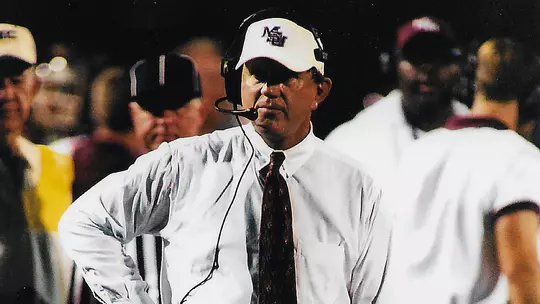
The 1998 season was Sherrill’s eighth with the Bulldogs. He’d arrived in 1991 and immediately put Mississippi State on an upward trajectory, delivering the school’s first winning season in five years.
In 1992, State finished the season ranked No. 23 in the country. The Dawgs ended the year at No. 24 in 1994. Winning was becoming commonplace for the Maroon and White. Then came 1997 which, in many ways, laid the foundation for what was to come in 1998.
The Bulldogs got off to a 7-2 start in ’97, were the 15th-ranked team in the country and led the SEC West with two games to go. But a 10-point loss to Arkansas and a heartbreaking Egg Bowl defeat at the hands of Ole Miss not only ended State’s title hopes but left the Dawgs out of a bowl game as well.
There was understandable disappointment. However, the letdown was perhaps the first log on the fire of what would become a blazing inferno in ’98.
WOMACK: “[The way ’97 ended] was one of the biggest things…A lot of guys were used to winning. Not just championships, but winning, winning.”
Put another way, the Bulldogs were a group full of guys who couldn't stomach losing. They were a squad with many that had no desire to look at 1997 as anything other than a massive missed opportunity. So they all licked their wounds and headed into '98 motivated and hungry.
MADKIN: “I knew this team was special because the culture was significantly different. We had a blue-collar, never-give-up type of team…You could tell it in the offseason by how everybody worked. We had something to prove. We had a chip on our shoulder.”
As cliché as it may be to say, they were a bunch of Dawgs. Up and down the roster, there were guys who just wouldn’t blink and were ready to meet the big moments that’d come their way. They were unafraid, no matter what challenges were about to come at them.
WOMACK: “I’m glad the one thing we didn’t have [at the time] were [recruiting star rankings] – five-star guys or four-star guys. I probably would’ve been a three-star guy. I don’t know. But, we didn’t care about the big teams in the SEC. Our mentality was, we can play with anybody.”
It was a feeling that permeated the entire group. These guys knew they belonged, from the veterans, right down to the youngsters like the redshirt freshman signal caller who took over starting duties in the fourth game of the season.
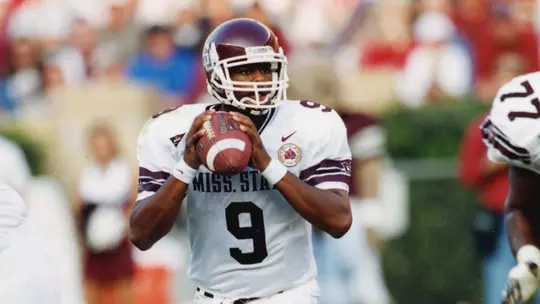
Madkin – an Alabama native that had chances to go elsewhere – originally came to MSU in large part because he believed he’d get a fair chance to show what he could do in Starkville.
MADKIN: “Mississippi State had a history of playing black quarterbacks [like] Don Smith, Sleepy Robinson [and] Derrick Taite. People don’t realize, when you’re being recruited, kids are watching TV. They want to see who they identify with.”
Madkin identified with MSU. He also trusted in what Sherrill was selling at the time.
MADKIN: “He said, ‘We’re going to win here at Mississippi State.’ And I believed him.”
And win the Dawgs did in 1998, right out of the gate.
State started the year with a dominant, 42-0 victory over Vanderbilt and the Bulldogs were off and running. MSU went on to win five of the year’s first six games, including a 3-0 start in SEC play.
There were heroes aplenty and multiple Bulldogs were beginning to etch their names into MSU lore.
Johnson was among the brightest stars. The Bulldog back was on his way to producing what was – at the time – the greatest rushing season in Mississippi State history in terms of yardage.
SHERRILL: “If J.J. had spent four years at Mississippi State, he’d have been [everyone's] all-time favorite player because of how productive he was and the way he conducted his business. Not only the fans, but the players loved J.J. Johnson…He had not only his size and strength, but his ability to get through the hole and the ability to run through tackles. “
MADKIN: “[Johnson’s] work ethic and sheer determination to get that one or two extra yards, I never saw anything else like that. I was fortunate to have a front-row seat to see that…He had the most humongous thighs and so much power in his legs. I remember playing Alabama and he was giving them so much pain consistently on every play. I saw one play where two Alabama defensive backs didn’t want to tackle him. They just touched him on his shoulder and let him run into the end zone. That’s how dominant of a player he was. On top of that, he was tough as nails and played with a lot of injuries. That said a lot about J.J.”
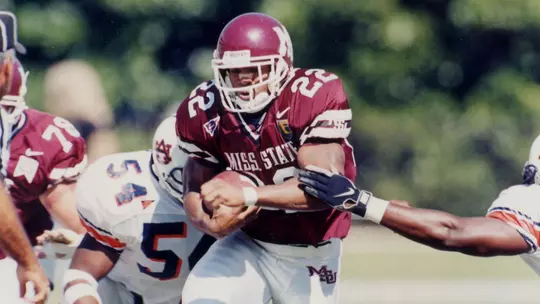
Johnson and the entire State offense benefitted from a massive offensive line. It was massive in terms of size as well as in talent level.
There was Randy Thomas – who Womack claims wasn’t just a fantastic offensive lineman, but a bottomless pit. Thomas allegedly ate nine 16-ounce steaks at a steak-eating contest leading up to the Cotton Bowl that wrapped up the 1998 season.
There was Womack, too, protecting quarterbacks, blocking for State’s tremendous rushing attack and making everyone around the country respect the name Pork Chop.
SHERRILL: “The first time I saw Pork Chop, I was wide-eyed. But what I remember about Pork Chop was how quick his feet were and how light he was on his feet. Then digging down into his life, his dad was a professional boxer and he started Pork Chop at a very early age – like three or four – jumping rope. It gave him the ability to have really great balance and quick feet.”
Thomas and Womack were just two of the men who made up a dominant offensive front.
SHERRILL: “You had players that not only had size, but had toughness to them.”
MADKIN: “That was the anchor of our team. They used to give me a hard time about being young in the huddle in the SEC, but at the end of the day, they had this cowboy-culture mentality…They’re hard on you, but they’re always going to have your back. That’s what we had, and you didn’t want to let these guys down.”
The State offensive line made for a perfect ground-first offense. Sure, there were weapons like Prentiss who could take the top off a defense.
MADKIN: “He was small in stature, but he played like he was Calvin Johnson. He was electric. I still haven’t seen anyone that could cover him one on one.”
However, the Bulldogs' calling card was the rushing attack. And they really didn’t mind if the opponent understood what was coming.
WOMACK: “We were fit for the run. Everybody could block at every position. Even the receivers…We knew week in and week out, we’re going to run the ball. You knew it too and we didn’t care. We’re going to go man to man and see what you’ve got.”
And if that offense didn’t work? Well coordinator Joe Lee Dunn’s defense would pick up the slack. You likely know Dunn’s aggressive style put fear into the heart of offensive coordinators around the country. But what you might not realize is what allowed Dunn to be so aggressive was the smarts behind the calls.
SHERRILL: “There are two types of coaches. Are they technique coaches and old school, or are they schemers? Which means they’ll put players in different positions. There were a couple of games we started where the whole defensive line stood up a yard off the ball. No one had seen that as far as opposing teams. And Joe Lee had tremendous memory. He could tell you plays that a team ran five years [prior] and their blocking scheme. So, he spent all his time on the blocking schemes of our opponents so he could figure out a way to put one more man than they could protect… He’d have one more man on the weak side or strong side than [an opponent] had to protect. If you had three guys on the strong side or two guys and a back on the weak side, he’d send four. All of a sudden, there was one guy wide open that they couldn’t pick up.”
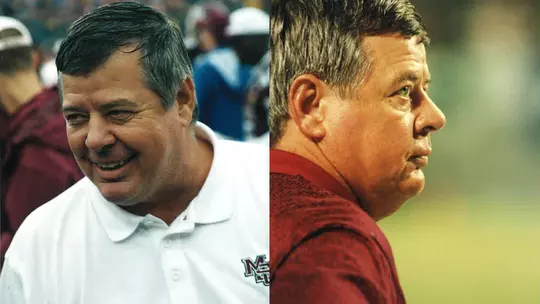
It was a perfect recipe. Between State’s offensive weapons and Dunn’s defense, the Bulldogs were a machine. But they weren’t perfect.
After MSU’s hot start to the season, they lost road games at LSU and Kentucky. The Kentucky loss particularly stuck in Sherrill’s craw. It still seems to, even today.
SHERRILL: “I made the decision to go for two early in the game, and it ended up costing us the game. If I’d have gone for one, we’d have ended up tied or won the game at the end.”
Fortunately, Sherrill had built not just a talented team, but a resilient one. They bounced back to beat Alabama. Then, in a game that’ll remain etched in the minds of Bulldogs who witnessed it forever, Madkin and kicker Brian Hazelwood’s fourth-quarter dramatics put MSU over Arkansas 22-21.
Suddenly, Mississippi State was just a win away from wrapping a Western Division crown in Maroon and White. All that stood in the Bulldogs’ way was Ole Miss. However, the Rebels wouldn’t be standing in the way for long.
MSU went to Oxford, scored a touchdown in every quarter and didn’t allow one. Final score: State 28, Ole Miss 6. The Bulldogs were Atlanta bound.
MADKIN: “It was crazy…It’s something you always remember. Everybody was hugging. The coaches were crying. I was fortunate enough to be a part of it, and I’m glad our fans could be a part of that as well.”
SHERRILL: “There was not only enjoyment but tons of excitement. You work so hard every year, but then all of a sudden, you’re able to have success and reach your ultimate goal. And the SEC is a little different than most conferences. In the SEC, being able to go to the conference championship…to the people in the SEC, that’s a big deal. All the players that have carried an SEC championship ring around, they enjoy that sometimes more than a national championship ring. Being able to know that you’ve won the West and you’re going to play in Atlanta for the championship, [it’s special].”
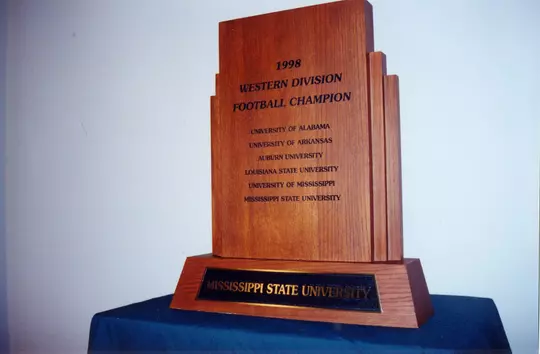
It's an accomplishment that’ll forever be treasured in Starkville. In more than three decades of SEC championship games, Mississippi State remains the only school from the Magnolia State to have ever competed in one.
WOMACK: “Now that I look back, it’s like, ‘We actually did something.’ It’s so tough to get there. The SEC is tough. That year though, we were tougher. Going to that game is a moment I cherish now. I can look back and soak it all in.”
Womack isn’t the only one. Everyone associated with Mississippi State still relishes the time the Bulldogs were division champions. This weekend, ahead of MSU’s homecoming game against Kentucky, that special team will be celebrated once more.
As eager as the fans are to see their heroes again, the players who’ll return are just as excited to be back in front of the folks that helped make their historic accomplishment possible.
MADKIN: “We thank y’all for remembering us. Thank you for keeping us in your hearts and minds. That means a lot. I told my son the other day, ‘Records and stats are meant to be broken, but people are always going to remember how you made them feel.’”
And no football team that’s ever worn the Maroon and White has conjured up feelings quite like that remarkable group in 1998.
What a year. What a team. What memories.
Memories that, even a quarter century since it all happened, have folks still asking, ‘How 'bout them Dawgs?’

